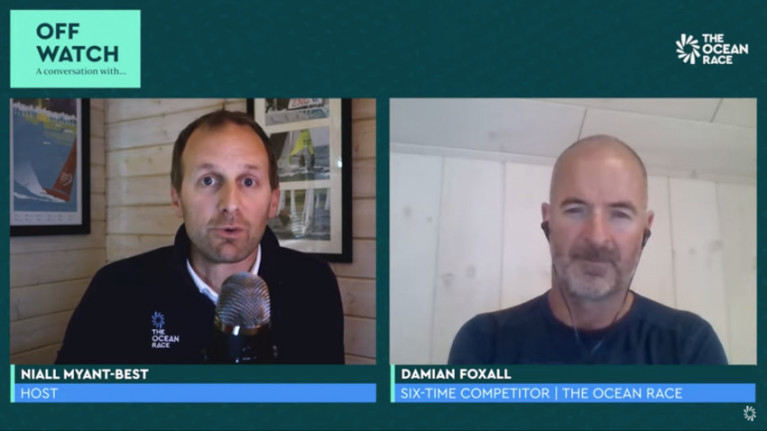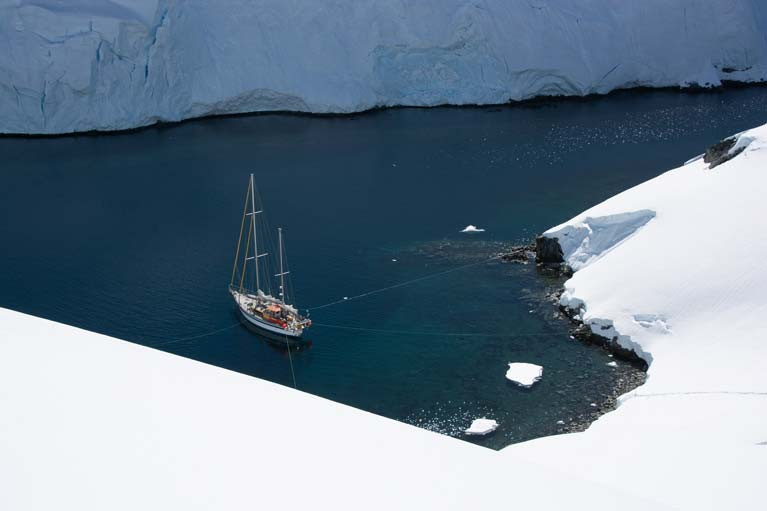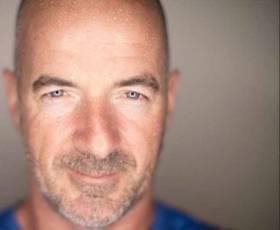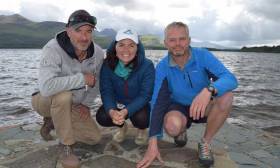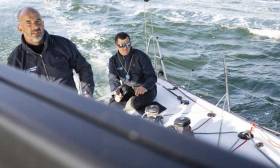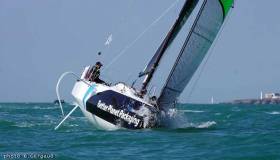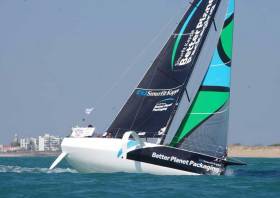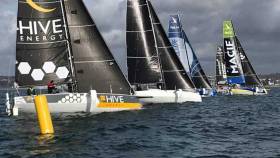Displaying items by tag: Damian Foxall
Ireland's veteran round-the-world sailor Damian Foxall of County Kerry will join the crew of 11th Hour Racing Team for Leg 4 of The Ocean Race from Itajaí, Brazil to Newport, Rhode Island, USA.
Skipper Charlie Enright will draw on his squad of IMOCA sailors and will be joined by Navigator Simon Fisher (GBR), Trimmers Francesca Clapcich (ITA) and Damian Foxall (IRL), along with media crew member Amory Ross (USA).
Enright commented, “We have two changes to the onboard team for this upcoming leg to our hometown of Newport. We are bringing back Francesca in place of Justine Mettraux [SUI], and new to the line-up onboard Mālama is the hugely experienced Damian Foxall, in place of Jack Bouttell.
“We are very lucky to have such a deep bench in our team. The Southern Ocean leg took its toll on us all - the boat as well as the people! We had always planned to give our team members a rest and, looking around the fleet, a lot of the other teams are doing the same. Relative to the competition, we continue to feel strong.”
This will be the first leg of The Ocean Race 2022-23 sailed by Foxall, a six-time veteran of The Ocean Race, who has over 450,000 nautical miles under his belt. “I was really pleased when Charlie asked me if I would sail onboard for this next Leg to Newport,” commented Foxall.
“Every time the race has come to Itajaí, I’ve either sailed into or out of the city, so I’m really proud to be doing it once again. I’ll be stepping into some big boots and racing alongside fantastic sailors across the fleet, but we have what I believe is one of the best boats for this leg, so I’m looking forward to getting going.” Foxall also manages the Sustainability Program for 11th Hour Racing Team, delivering on the team’s Planet Positive commitment, including measuring the climate impact of the team’s complete operations, reducing where possible, insetting, and finally compensating, drawing down 20% more greenhouse gases than the team emits.
Having sailed onboard Mālama from Alicante to Cape Town in Legs 1 and 2, Clapcich returns to the team’s 60-foot IMOCA, replacing Justine Mettraux (SUI), who raced onboard for the mammoth 37-day, 20-hour leg from Cape Town, South Africa to Itajaí, Brazil. Mettraux is scheduled to step back onboard for Leg 5 from Newport, Rhode Island to Aarhus, Denmark.
Olympian Clapcich is looking forward to getting back onboard the boat. “It has been almost two months since I’ve raced onboard, and I have missed it. I am raring to go, and we will be pushing as hard as we can to climb that leaderboard; now is our time.
“Before leaving home, I told my wife: we are going to win this leg. I also think it’s good to come in fresh, without having sailed the previous leg, which is what Damian and I will be doing. This is an important leg for the team, and I’m pleased to be onboard for it.”
The 5,550-nautical mile (6,387-mile/10,279-kilometer) fourth leg of The Ocean Race 2022-23 is a complex northerly passage that takes the teams back into the northern hemisphere on the way to 11th Hour Racing Team’s US base in Newport, Rhode Island.
Picking the route from Itajaí to Newport will be a challenging one for the team’s Navigator, Simon Fisher, as he negotiates the team’s route up the coast of Brazil, picking their route through the Doldrums, tackling the trade winds, and crossing the Gulf Stream, before the notoriously tricky approach to the Ocean State.
“This leg will be a massive contrast to the Southern Ocean,” explained Navigator Simon Fisher. “It is a nice opportunity to get back into the style of sailing where it is all about the small decisions.
“In the last leg, it could be described as painting in broad strokes, but this leg is all about getting the small details right to make the overall plan work out.”
Previous editions of The Ocean Race have seen light wind finishes on this route, and no matter how familiar the waters of Narragansett Bay may be to them, the 11th Hour Racing Team sailors will be taking nothing for granted until Mālama’s bow crosses the finish line off Newport’s Fort Adams State Park.
Media crew member, Amory Ross, is looking forward to sailing back to his home state. “Anyone who calls Newport home knows the passion and enthusiasm for sailing the Rhode Islanders have, and this is the reason why we all choose to make it home,” he commented.
“One great thing about sailing to a place like Newport in a race like The Ocean Race is that we get to share it with the rest of the world. I’m always very proud of the turnout and enthusiasm for the event, and I know it will be the same with this edition of the race. It is something that motivates us hugely on the water.”
With a second and two third places secured in the race so far, Enright is looking for a strong result as they head home to Newport. “I certainly wouldn’t get on the boat with a crew that I didn’t think could win a leg that was really important to me,” he said. “We look forward to getting out there and getting into it.”
11th Hour Racing Team Crew for Leg 4 of The Ocean Race 2022-23:
Charlie Enright (USA) - Skipper
Simon Fisher (GBR) - Navigator
Francesca Clapcich (ITA) - Trimmer
Damian Foxall (IRL) - Trimmer
Amory Ross (USA) - Media Crew Member
Ireland’s Links on Deck and Behind the Scenes with The Ocean Race IMOCA 11th Hour Racing
11th Hour Racing Team’s longtime sustainability manager Damian Foxall isn’t Ireland’s only connection to the IMOCA getting ready to foil around the world in The Ocean Race 2022-23 this month.
Cork sailor James O’Mahony, a veteran of two previous editions of The Ocean Race, is boat captain on the team that will sail with a crew of four — plus on-board reporter Amory Ross — under skipper Charlie Enright.
“This race has been a long time coming, but we feel ready,” Enright said at the close of 2022 about the race, which will see five IMOCAs included for the very first time alongside a fleet of VO65s taking part in a series of sprint races around the globe-spanning route.
The action begins this Sunday 8 January with the In Port Race in Alicante before the IMOCA and VO65 fleets depart for Mindelo, Cabo Verde on 15 January on the first leg.
Viewers in Ireland can catch Sunday’s action live on Eurosport and discovery+ with the VO65s scheduled to race from 1pm GMT and the IMOCAS from 2.30pm GMT.
In Conversation With Damian Foxall: ‘You Can Take A Sailor Off The Water But Not For Very Long’
The latest edition of The Ocean Race’s Off Watch video interview series sits down with Damian Foxall, Irish veteran of the yachting challenge formerly known as the Volvo Ocean Race.
Kerryman Damian Foxall has competed in the round-the-world race six times, including a winning campaign in the 2011-12 edition.
In more recent years, he’s charted a new course as an advocate for sustainability both in the sport of sailing and the world in general.
But in his own words: “You can take a sailor off the water but not for very long.”
Here he tells Niall Myant-Best how how listening to glaciers shearing off Antarctica during an expedition last year gave him a new respect for sea ice, and about his pride in sailing into Galway as part of the winning Groupama team and helping to raise the profile of sailing in his homeland.
He also steers into choppier waters, such as how winning does come with costs — to family, to the environment — that he’s hoping to change through his work in sustainability for 11th Hour Racing and with Irish Sailing.
Watch the full interview below:
On 1st December last year, ‘Team South’ departed Ushuaia, Argentina, and headed south across the Drake Passage.
Damian Foxall, Niall MacAllister and Lucy Hunt are ‘Team South’ - the three-person crew of highly experienced sailors and marine scientists leading a full season of Antarctic expeditions onboard the 66ft ketch-rigged sailboat ‘Ocean Tramp’.
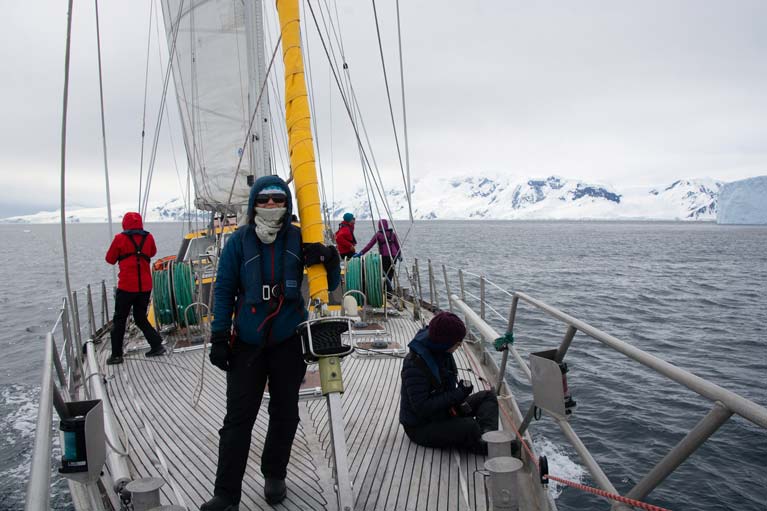 Ocean Tramp decks with Lucy Hunt in the foreground Photo: Caesar Schinas
Ocean Tramp decks with Lucy Hunt in the foreground Photo: Caesar Schinas
The ketch changes its group of up to eight guests every two or three weeks - guests can comprise photographers, scientists, adventurers - in fact, anyone looking to fulfil their lifelong dream of witnessing and exploring the magic of Antarctica.
Lucy Hunt, Marine Biologist, enthuses: “It had always been a dream to work in Antarctica and now I´m here, I know that dreams do come true, so be sure to follow yours! It is one of the most wonderful places I have ever visited from the awe-inspiring landscapes to the abundant wildlife”.
Ocean Tramp is strong, fast and comfortable, and the onboard banter is great - what more could any visitor want? The team is excited to share the last expedition of the season with fellow Irish adventurers and invite you to join them. It’s an often overused phrase, but this really is the chance of a lifetime – to join such an amazing team, with Damian Foxall at the helm and marine biologists close at hand. Quixote Expeditions will fly you to Punta Arenas, Chile, and then on to Antarctica where you meet Ocean Tramp and step on board for two weeks of Antarctic adventures. You complete your adventure by sailing back across the Drake to the Falklands, before flying home. Now that ticks a lot of boxes!
The Antarctic Ecosystem
Far from being the ice desert that one might imagine, this continent is more alive than many other places on Earth. The ecosystem of the ice algae supports a biomass and a range of species, from the minute to the massive, that congregates here each Austral summer, often right under the boat!
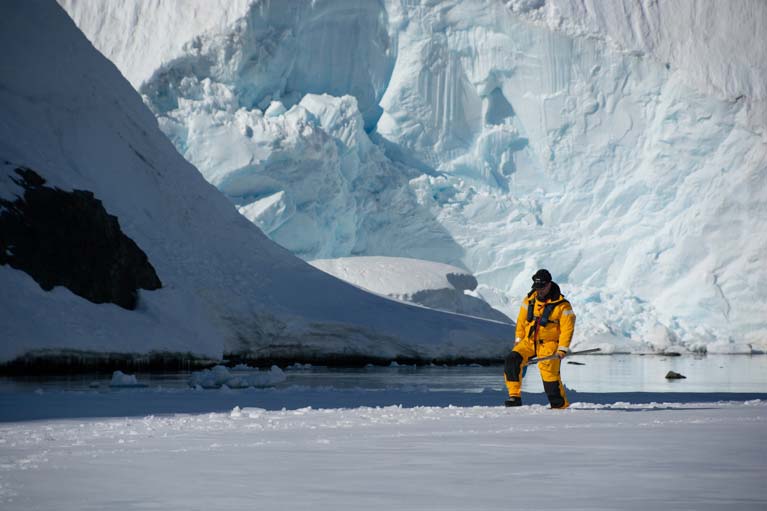 Damian Foxall on the ice Photo: Caesar Schinas
Damian Foxall on the ice Photo: Caesar Schinas
Damian sums up “Seals wallow and belch, the leopard seals lick their lips and bide their time, while the whales feast in spirals of bubbles abeam.”
The team have witnessed Minke, Humpbacks and Orca all coming alongside or under the boat. Lucy told us “Experiencing Antarctica is both mind-blowing and humbling and has brought a tear to my eye a number of times trying to take everything in - being checked out by humpback whales, or visiting the amphitheatre of over 100,000 chinstrap penguins, and dodging the hundreds of penguins on the highway to the Bransfield Strait!”
This year is particularly special
Damian Foxall told us “It was an honour for us to be down here in the same week that, 200 years ago, Irishman Edward Bransfield arrived and charted a section of the Antarctic peninsula for the first time”.
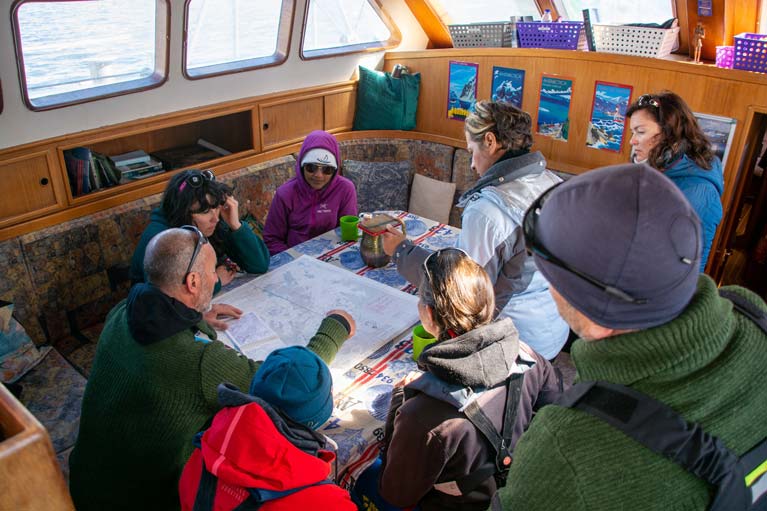 Route planning on board Ocean Tramp Photo: Caesar Schinas
Route planning on board Ocean Tramp Photo: Caesar Schinas
Bransfield sailed his ship into the unknown, without charts, into an area that was known for ice, but little more. It’s difficult to begin to understand today what those men experienced and achieved. In the current age where human standards are defined by comfort and consumption, they lived to another norm, of wooden ships and iron men.
Two hundred years later the environment has changed little, with the exception of the influences of climate change. While man is developing 99% of the rest of the world, here even at the tip of the Antarctic peninsula one feels that the landscape of ice, rock is resisting human impact - for now.
Damian Foxall invites you to join the team, and take up one of the last couple of places available on the final trip of the season: “Antarctica enthrals, en-wraps, inspires you and defies the senses that struggle to even begin to put into scale what the eye beholds but the brain cannot compute. Once, twice, will never be enough”.
You can follow the team’s adventures and find out how to join them here
Round the World Sailor Damian Foxall Catches Up on Learning at Poolbeg
When Henry Cromwell in 1654 as then Chief Justice of Ireland, decided to rid the city of Dublin of everyone of Irish blood by ordering them to move two miles outside the capital, his decision gave the impetus which created great maritime communities that have survived the test of time around Irishtown and Ringsend and where I always like having a reason to call into the welcoming and highly sociable Poolbeg Yacht and Boat Club.
That opportunity this week resulted in my catching Ireland’s international sailor studying maritime matters to refresh and add to his professional knowledge. Within a fortnight he will be applying what he has learned down in Antarctica, a region in which he has sailed, but not operated from before and where he will be commemorating what a Cork sailor did 200 years ago.
In January the County Cork committee which has spent years trying to bring Edward Bransfield to the attention of the Irish public will unveil a monument at the East Cork harbourside village of Ballinacurra to his memory, as the first man to set eyes on Antarctica. Damian, a Kerryman who knows well the legend of Tom Crean, will be following the still-emerging story of Bransfield, as part of the Irish Team South will be running expeditions in Antarctica and retelling the story of Bransfield, with the support of the Cork group whose determination to have him publicly remembered I have discussed previously in this Podcast. Lucy Hunt from Sea Synergy in Waterville and Niall McAllister from West Cork Sailing make it a Kerry/Cork combination. For this week’s Podcast, I was in Poolbeg as Damian emerged from his morning of study!
Listen to the Podcast below
Two centuries after the “white continent” was recorded officially for the first time by an expedition led by Irishman Edward Bransfield, Kerry round-the-world offshore racer Damian Foxall plans to explore Antarctica by sail.
Kerry-born Foxall will be accompanied on his “Team South” expeditions – which are open to the public - by marine biologists Lucy Hunt and Niall McAllister.
As The Irish Independent reports in its Review section today, the three highly accomplished sailors and scientists from Cork and Kerry will take their background in environmental education, research and adventure to head to Antarctica, to experience first-hand the impact of climate change and witness the fragile ecosystem inhabited by penguins, albatrosses, whales and seals.
"I look forward to stepping foot on the continent for the first time"
“Having been involved in over ten round-the-world races, I have seen the southern ocean and the world in a way that few get to experience - icebergs, albatross and forgotten sub-Antarctic islands,” Foxall says.
“ I look forward to stepping foot on the continent for the first time and to sharing this unique privilege with my team and our guests,” he says.
The trio will work with Quixote Expeditions, skippering the 65ft ketch, Ocean Tramp. The Antarctic expedition company has an ethos of community collaboration, education, scientific research and minimal footprint.
When not offshore racing,Foxall is a passionate adventurer and advocate for ocean health, while Niall MacAllister, who runs marine wildlife expeditions and sail training in west Cork, has recently been skippering on the research sailing sloop, Song of the Whale, for a series of marine mammal research programmes.
Lucy Hunt created the ocean health education programme for the Volvo Ocean Race 2017/18 and is now working on the new programme for 2021/22 Ocean Race, while directing her Sea Synergy marine education and awareness centre in her native Waterville, Co Kerry.
The trio has linked in with ornithologist and Antarctic guide Jim Wilson and polar explorer enthusiast Eugene Furlong, who are involved in the project to commemorate Edward Bransfield in his native Ballinacurra, Co Cork, in January 2020.
Team South expeditions start at 9,000 US dollars per person for two weeks, excluding flights. Photographers and film crews are among early bookings, and there is availability on some legs for equally curious citizen scientists and adventurous types, who won’t need much sailing experience.
The five consecutive expeditions start in December and end in March, and the last leg of the journey includes sailing the Antarctic Peninsula before crossing the Drake passage to the Falkland Islands.
A free berth is awarded each trip to a research scientist throughout the southern summer season which runs from November to March. More details are here
Read more about Team South and about Edward Bransfield who put Antarctica on the map in The Irish Independent here
Ireland’s Tom Dolan and Damian Foxall finish in an excellent final leg fifth place in the Sardhinha Cup. As Afloat previously reported, the Irish duo set sail on 30 March, 2019 to brave the elements in their Dubarry sailing boots. The unique designs and the very best technical materials ensure Dubarry sailing boots prove themselves time and time again in some of the most challenging conditions at sea. And this is why Dubarry boots have rightly gained the respect and trust of those that sail the world’s oceans.
Tom: “Everyday I work on the boat I do it in my ten-year-old pair of Dubarry sailing boots, they are a bit battered but still comfortable and still dry. It’s great to know that we are going to sea with well made, good quality material. A huge aim of this year’s campaign, in conjunction with Smurfit Kappa, is to promote sustainability in sailing projects. Using materials that last is key to this, and thanks to Dubarry for being part of it.”
"To go fast you’ve got to have dry feet"
Damian: “To go fast you’ve got to have dry feet, especially this time of year in the middle of Biscay and having good quality material is the cornerstone of this. The better you feel, the more you can concentrate on the two key pillars of offshore racing, going fast in the right direction!”
Dolan & Foxall's Excellent Final Leg Fifth Place in Sardinha Cup
After minor frustrations marred the first two legs of the Sardinha Cup, Ireland's Tom Dolan and Damian Foxall on Smurfit Kappa finished the first offshore series for the new Figaro Beneteau 3 class on a high note, securing an excellent fifth place on the 280 nautical miles third and final stage.
"That is more like the result we felt we were capable of. On the first two legs, we were sailing fast and generally going in the right direction. But this was a leg when most things went right." smiled Foxall on the dock this morning in Saint-Gilles Croix-De-Vie on the French Vendée coast, the host port of the event and 'home' to boatbuilders Beneteau.
After their 13th place in the shorter, opening Vendée Warm Up leg, then 20th on the first long offshore stage and their fifth on this leg - which was shortened this morning from the scheduled 320 miles to 280 miles - the Smurfit Kappa pair finish 13th overall
From a 'mediocre' start from Saint-Gilles-Crox-De-Vie on Thursday afternoon, the flying Irish duo hit their stride in breezes to 20 knots and proved fast on the 130 nautical miles downwind to a turning mark off Arcachon, south of Bordeaux. They were well inside the top ten of the 32 boat fleet at the southernmost turn.
Yesterday, Friday, Dolan and Foxall gained places on the ensuing upwind stage when there was little wind and the key was working the wind shift created as the sea breeze came in close to the land.
At one point they were up to fourth but a slight hiccup -dropping the spinnaker into the foil - cost them momentarily in the very close racing. Then the sensible choice was to consolidate and cover the fleet to secure the top 5.
"I'm happy with that." Dolan grinned, "It was disappointing not to hold on to good early positions on the first two stages, but this is more of a correct result in terms of how we have been sailing."
"We definitely had good speed again on the run and made our gybes at the right time. I have good sails from Technique Voiles, a smaller French loft, and with the big spinnaker, in particular, we seemed to be able to sail a little lower and stay fast." Dolan added.
Foxall, a veteran of ten round the world races whose first experience back with the Figaro class this was after a 20 years hiatus, added:
"Tom has been putting in the time and has good potential going forwards from here. It is a new boat, the Figaro Beneteau 3, and it will be a lot harder to sail solo, but this a great way to start the season for him."
"I really came in with no expectations at all." the round the world sailor from County Kerry admitted, "But in many ways, it is like riding a bike, the reflexes come back automatically and you get the boat going fast. Once we found the buttons to do that we seemed to be able to do that. He has good sails and has put in a lot of work with the Lorient training group."
Foxall moves on to his next major project now. Asked if his experience with the new Figaro and his ebullient compatriot Dolan might tempt him to return to the Figaro in which he cut his solo and short-handed teeth some 20 years ago, Foxall said: "I suppose it is 'never say never', but for sure it is great, great racing. It felt very familiar and it was nice to be in that comfort zone."
Won overall by three times La Solitaire champion Yann Eliès sailing with French-based British co-skipper Samantha Davies, the Sardinha Cup has been a useful first event for the fleet and for Dolan who now starts his solo training looking towards the season's pinnacle, June's La Solitaire URGO Le Figaro.
Smurfit Kappa, the new Figaro 3 being raced in the current Sardinha Cup series in France by Tom Dolan and Damian Foxall, has been comfortably in the top ten since the start of the 320-mile Leg 3 off St Gillles yesterday at 1330hrs. The course is south to a turning mark off Arcachon, then north leaving Ile d’Yeu to port before heading northwest to another turn before the final leg southeast to St Gilles, where the finish is expected tomorrow (Saturday).
"Smurfit Kappa has shown some impressive bursts of speed"
Smurfit Kappa has shown some impressive bursts of speed, but despite slower going since making the turn off Arcachon during the night, the Irish duo have been steppd up the challenge, and this morning are shown as a close third in line honours, just 1.1 miles astern of leaders Samantha Davies and Elies Yann in St Michel. The race has been slightly slower for Joan Mulloy and Mile Golding in Atlantic Youth Trust - they are shown at 29th in line honours, five miles astern.
Race Tracker here
Figaro Sardinha Cup Fleet Delayed in Port by Damage Repairs
After the heavy going experienced for much of the first two stages of the Sardinha Cup for the brand new Figaro 3 boats, a significant part of the fleet had sustained such serious rig problems that the long-distance Leg 3 has been postponed until the weekend in order to allow round-the-clock working in port at St Gilles Croix de Vie in order to get the boats ocean ready once more.
Ironically, the Bay of Biscay is now experiencing extremely light winds for the time of year, but the strong breezes may have returned when the fleet puts back to sea. Ireland’s Tom Dolan and Damian Foxall on Smurfit Kappa had their own problems when they became enmeshed in fishing gear while well placed during Leg 2, and currently are well down the line with a 13th and a 20th recorded in the two legs sailed, while Joan Mulloy and Mike Golding were early victims of the technical failures and had to put into the nearest port.



























